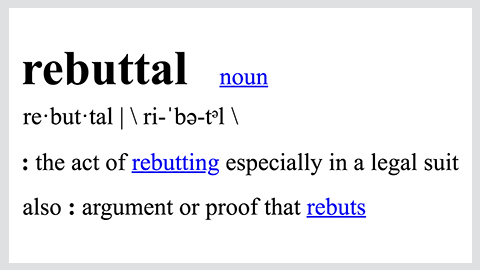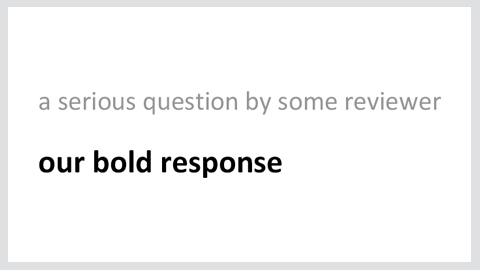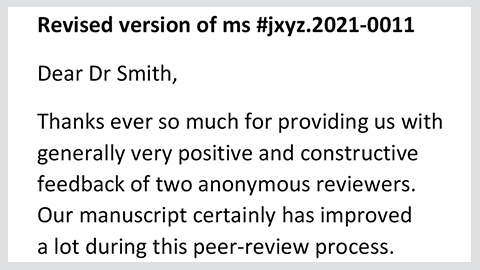How to reply to reviewers’ comments
As a scientific author, reviewer and editor, I have written a fair number of rebuttals and read even more. After receiving positive comments about my rebuttals from several colleagues, I posted my Top Tips on Twitter. Here is an extended version of those recommendations.

1. Truly engage in peer review. The rebuttal is part of the formalized communication process between colleagues; neither reviewers nor editors are any better or worse than you.
Do not apologize for anything from the old version of the manuscript. I personally would not even call a single thing in the old manuscript a mistake (a typo at most). Just do better! This rebuttal is all about the current, massively improved version. Factually state all the improvements that you have made.
2. Whatever happens, never respond in a rush. You might receive reviewers’ responses at any time of the day or the week. However, apparently a lot of us receive these emails on a Friday afternoon, just before we want to head off for a long weekend. Do not respond immediately. Should the reviewers’ comments stir you emotionally, let them rest for a day or two before you write a response.
If you are still fuming — feeling utterly unfairly treated — a good practice is to write a response not directly into your emailing software but in Word and to send it to yourself only. This also works wonders with other sensitive emails.
3. The rebuttal is a sales pitch. You want the editor to agree with you constantly while reading your rebuttal. So please make sure that it is ultra-clear and a joy to read. Don’t use technical jargon excessively. Do not force the editor to scroll back and forth through your text.
- If reviewers 1 and 3 have a similar question, simply repeat your answer, perhaps with some paraphrasing.
- If you have to cite scientific papers (such as your own awesome new preprint somewhere else), give the reference in full where it is needed within the text.
- Should a reviewer ask you for some exact values, please do write out those numbers — don’t force the editor to look them up externally.

4. Divide and conquer. The Romans knew about this. Some reviewers provide rich and very dense text. Feel free to break down those text blocks into smaller units, maybe sentences or even phrases, so that you clearly address each and every little part. Don’t provide a wordy reply to a wordy question; it smells as if you want to waffle over complex points.
5. Get the tone right. An editor might look more for the pitch of your writing than the actual response. I tend to be aggressively friendly and polite in a rebuttal but not leave any doubt at all that I actually have done something.
Do not write that you will “attempt to address” reviewer comments; address them.
Be conscious of the words you use. Have a dedicated proofing round to kill weak words. Do not use “some,” “a bit” or “many”; instead, include specific numbers and values in your response.
6. Clearly display the reviewers’ comments differently from your reply. Use a 10-point font shaded in gray for the reviewers’ comments, but write your responses in an 11- or 12-point font in bold black writing — never the other way around.

7. Never thank reviewers for the time they spent with the manuscript. After all, peer review is about the quality of the review, not about how long it took.
I always thank them for their intellectual input and their comments and ideas. If they spot a scientific error, I am honestly grateful to them — the review process might have saved me from an embarrassing erratum or even a retraction.
8. You might want to paraphrase the reviewers’ words. Should there be something in the reviewers’ comments that is very unclear or even insulting, no one is stopping you from rewording to soften, correct or reframe them in your rebuttal.
Please use this one sparingly.
I hope that these tips are useful when crafting your next rebuttal. Some might even be good to consider for your scientific writing in general. All the best with your next publications. Please feel free to share your opinions and ideas about rebuttals with me.
Enjoy reading ASBMB Today?
Become a member to receive the print edition four times a year and the digital edition monthly.
Learn moreFeatured jobs
from the ASBMB career center
Get the latest from ASBMB Today
Enter your email address, and we’ll send you a weekly email with recent articles, interviews and more.
Latest in Careers
Careers highlights or most popular articles

From humble beginnings to unlocking lysosomal secrets
Monther Abu–Remaileh will receive the ASBMB’s 2026 Walter A. Shaw Young Investigator Award in Lipid Research at the ASBMB Annual Meeting, March 7-10 in Washington, D.C.

Chemistry meets biology to thwart parasites
Margaret Phillips will receive the Alice and C. C. Wang Award in Molecular Parasitology at the ASBMB Annual Meeting, March 7-10 in Washington, D.C.

Decoding how bacteria flip host’s molecular switches
Kim Orth will receive the Earl and Thressa Stadtman Distinguished Scientists Award at the ASBMB Annual Meeting, March 7–10, just outside of Washington, D.C.

Defining JNKs: Targets for drug discovery
Roger Davis will receive the Bert and Natalie Vallee Award in Biomedical Science at the ASBMB Annual Meeting, March 7–10, just outside of Washington, D.C.

Upcoming opportunities
No matter where you are in your career and what future path you aspire to, everyone needs leadership skills. Join ASBMB for practical strategies for building and practicing leadership skills.

Close out ASBMB 2026 with a bang
The closing reception of the 2026 ASBMB Annual Meeting will be held at the Torpedo Factory Art Center in Alexandra, Virginia.

